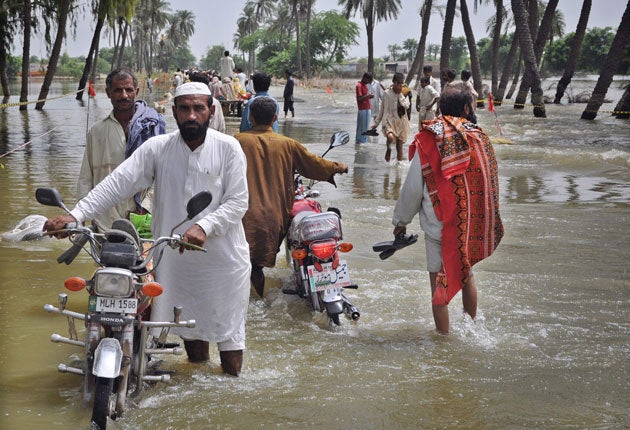One month on, Pakistan's torment worsens
Up to a million people have fled their homes in the past two days, as floods, never seen on such a scale, continue to sweep south

Your support helps us to tell the story
From reproductive rights to climate change to Big Tech, The Independent is on the ground when the story is developing. Whether it's investigating the financials of Elon Musk's pro-Trump PAC or producing our latest documentary, 'The A Word', which shines a light on the American women fighting for reproductive rights, we know how important it is to parse out the facts from the messaging.
At such a critical moment in US history, we need reporters on the ground. Your donation allows us to keep sending journalists to speak to both sides of the story.
The Independent is trusted by Americans across the entire political spectrum. And unlike many other quality news outlets, we choose not to lock Americans out of our reporting and analysis with paywalls. We believe quality journalism should be available to everyone, paid for by those who can afford it.
Your support makes all the difference.A month after devastating floods first brought havoc to Pakistan, thousands of people were still fleeing surging water yesterday as the Indus broke its banks close to a historic city in the country's south.
Officials said water had breached the river's defences close to Thatta and had also flooded a second canal that feeds from the Indus. Yesterday evening, officials estimated that the 20ft breach in the levee, which happened early in the morning, could cause flooding in the outskirts of the city by nightfall.
Most of the 200,000-strong population of Thatta, 75 miles south-east of Karachi, have already left the city, camping out by the sides of roads or trying to move to cities out of the flood zone. Hundreds of families were taking shelter in an ancient Muslim graveyard and in a nearby Hindu temple.
Up to a million people have been forced to flee their homes in the past 48 hours. With so many needing help and so little relief reaching the southern parts of Sindh province, scores of people blocked a road in Thatta to demand more assistance. They complained that the scant supplies available were usually thrown from the backs of trucks, resulting in crowds of people fighting among themselves for food and water.
"The people who come here to give us food treat us like beggars," an 80-year-old woman called Karima (who has just one name) told Associated Press. "They just throw the food. It is humiliating."
Another woman, Geeta Bai, 32, sitting outside an ancient Hindu temple, added: "I am fasting and praying for the flood to recede as it has snatched husbands from wives, sons and daughters from parents, brothers from sisters and sisters from brothers."
The floods began in the mountainous north-west of the country four weeks ago with the onset of annual monsoon rains. Ceaseless torrential downpours created flooding the likes of which had never been seen before. Then, as the water slowly began receding in the north-west, the floods moved southwards, enveloping large areas of Punjab, Sindh and Balochistan provinces. Aid organisations have estimated that around eight million people are now in need of emergency assistance and hundreds of thousands who need food, water and medicine are accessible only by air.
Of particular concern to the aid organisations are children, who are more vulnerable than adults to waterborne diseases and whose needs are often overlooked during emergencies.
"We fear the deadly synergy of waterborne diseases, including diarrhoea, dehydration and malnutrition," a senior official with Unicef, Karen Allen, said in a statement. Another UN official said if nothing was done an estimated 72,000 children in flood-affected areas and suffering severe malnutrition would be at high risk of death.
Having evacuated those homes that are at highest risk of flooding, the most pressing needs are to provide people with emergency supplies and shelter. But aid organisations say that with the lives of up to 17 million people affected, the authorities must also urgently start reconstructing homes, schools and infrastructure.
"One month into a crisis we would have expected the situation to have stabilised and the long-term planning to have begun. We are still in phase one of an increasing catastrophe. But Pakistan doesn't have the luxury of waiting for the emergency phase to be over before starting the reconstruction," Neva Khan, Oxfam's director in Pakistan, said. "Two-thirds of the population are dependent on farming. There is a real danger that many of Pakistan's farmers will miss the winter planting season, which is just round the corner in September, because their land is still under water or they have been forced to flee."
Even before the floods struck, the health of Pakistan's economy was fragile. Growth, forecast at 4.5 per cent this year, is now predicted at anything between zero and 3 per cent. Around 7.9 million acres of productive land have been devastated, at a cost of around $2.8bn. Pakistani officials held a meeting last week with the International Monetary Fund in Washington, seeking to ease the terms of an $11bn loan agreed two years ago.
So far, the official death toll stands at around 1,500 – remarkably modest given the scale of the disaster – but this is likely to jump once waters recede and a proper accounting is carried out. Not only are the floods by far Pakistan's worst natural disaster, the number of people affected is greater than by the Indian Ocean tsunami of late 2004, Pakistan's 2005 earthquake and this year's quake in Haiti.
Meanwhile, in the north-west of Pakistan, militants being questioned at a security agency building in the city of Peshawar overpowered two guards and took them hostage. The militants later surrendered and the guards were freed unhurt.
Join our commenting forum
Join thought-provoking conversations, follow other Independent readers and see their replies
Comments